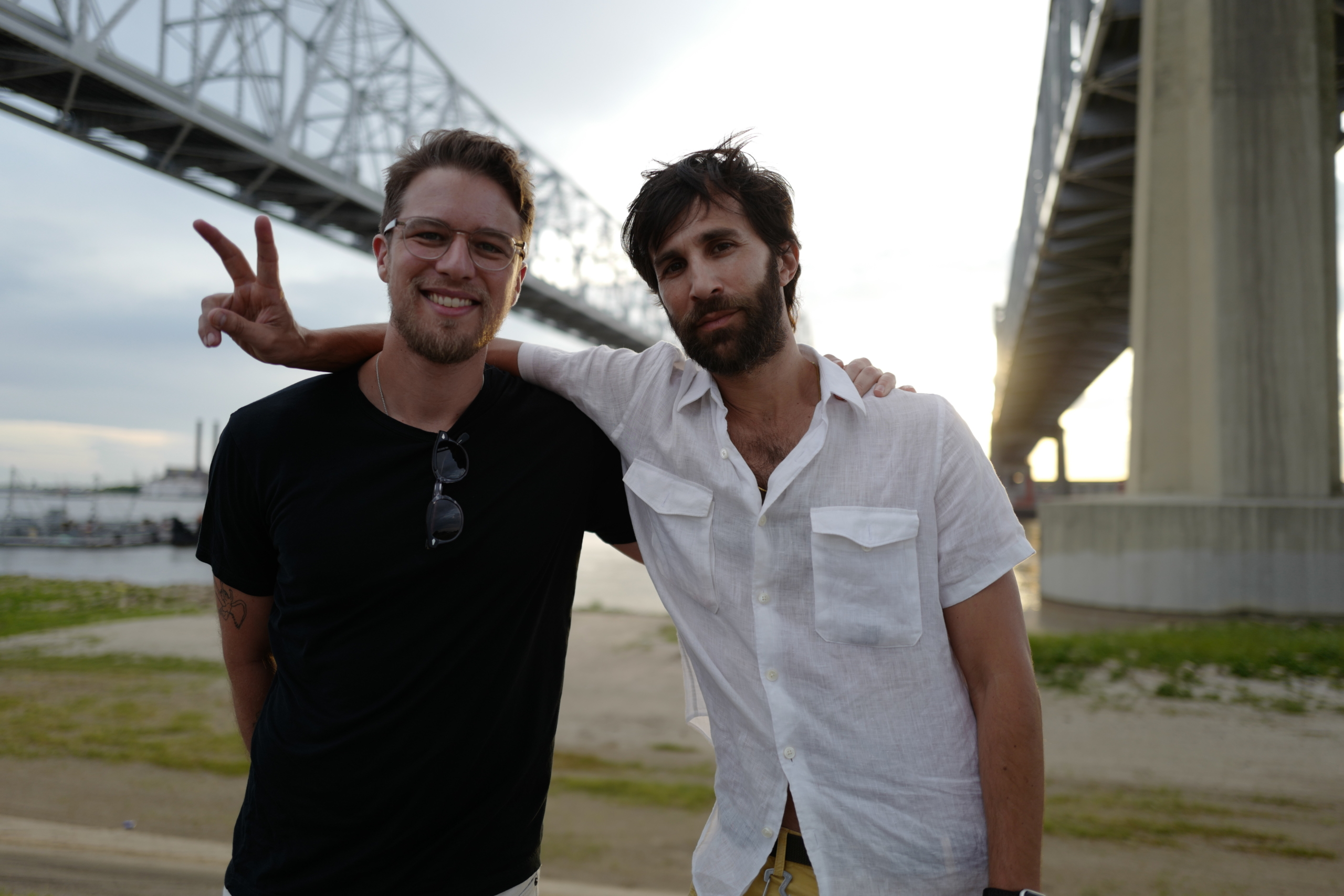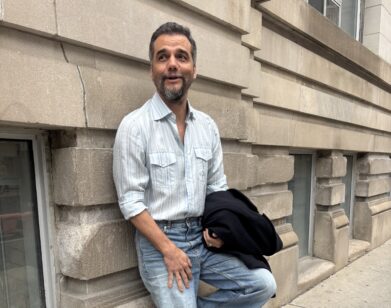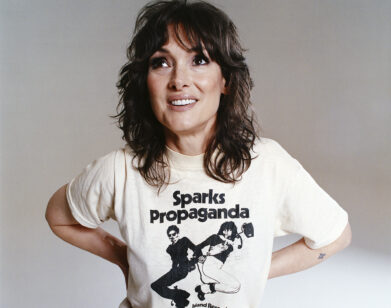in conversation
How Ariel Schulman and Henry Joost Made the Netflix Hit Project Power

In normal times, the summer blockbuster season would be winding down. By now, we’d know which movies bombed, which ones soared, and which ones snuck into the conversation seemingly out of nowhere. Box-office numbers would have determined who still had a job and who didn’t, which franchises died and which ones lived to see another sequel, and, in many ways, what the future of movies might look like. Without that weekly barometer of moviegoing appetites, the Netflix Top 10 has arrived to fill the vacuum, letting us know, essentially, which are the most popular movies in the country.
This past weekend, that honor belonged to Project Power, a sci-fi action flick that puts the superhero genre in a blender and spits it out as an on-the-ground New Orleans–set crime thriller. Starring Jamie Foxx, Joseph Gordon-Levitt, and Dominique Fishback, Project Power imagines a world where an illegal drug can generate superpowers for five minutes at a time, with one catch: the taker doesn’t know what their gift (or in some cases, curse) is until they take it. Directed by Ariel Schulman and Henry Joost, the filmmaking duo behind Catfish, two Paranormal Activity sequels, and 2016’s underrated thriller Nerve, Project Power is pure comfort food, arriving at a moment when CGI-enhanced thrills are hard to come by. Below, Schulman and Joost tell their friend Nicolas Heller, also known as the documentarian and Instagram star New York Nico, how they made it all happen.
———
NICOLAS HELLER: You guys have been working on Project Power for quite some time it seems.
ARIEL SCHULMAN: Yeah, it turned out to be more complicated than we thought it was going to be when we started. It’s been almost three years to the day that we first were given the script.
HELLER: Who gave you the script?
HENRY JOOST: It came from our agent. It was a spec script by this writer Mattson Tomlin, who we’d never heard of, and the script was extraordinary. I read 10 pages of it and called Rel and was like, “I think this is our next movie.” After reading the scene where Newt catches on fire, I was like, “If this happens in the first 10 minutes of the movie, and the characters are this good and this interesting, I have to make this.”
HELLER: You guys didn’t beat around the bush. No spoilers, but watching Machine Gun Kelly blow up in flames was an interesting way to start the film.
SCHULMAN: It used to be the first scene, but that’s such a hard pace to keep up, to start with a bang and never slow down. We actually went back to New Orleans and filmed what’s now the opening scene because the consensus was that the movie was starting too abruptly.
HELLER: Right. So you read the first 10 pages and you call Ariel, and then what?
SCHULMAN: I read the same 10 pages and said, “I agree, let’s spend the next three years of our lives working on this.” We’d never made a movie this big, with this many visual effects, and we’re so slow with whatever we make. So we both had a feeling that this was going to be a lot of blood, sweat, and tears. The seed of interest was: If you had a superpower, how could you make that cinematically scientific? And what would happen if superpowers had super side effects? We both felt like that was something we hadn’t seen dealt with in the genre. It’s cool that the Hulk could get really big and strong, but it always pissed me off that his shorts still kind of fit.
HELLER: How do you go from loving the script to getting the green light and making it?
JOOST: We declared our interest in the script. You basically have to climb to the top of the closest mountain and proclaim it, and somehow we convinced them that we were the right guys for the job. And then we decided that the script was so strong that we could just go out and ask producers at a bunch of different studios without attaching an actor, which we did, and there was basically a bidding war over the script, which Netflix won.
SCHULMAN: I don’t know if anyone would be seeing the movie right now if we’d gone with a movie studio.
HELLER: How relieved were you when all the movie theaters shut down and you knew that you had this film that was going to Netflix?
JOOST: It’s very bittersweet. I don’t want to live in a world with no movie theaters. That’s one of my favorite things to do. Missing a whole season of summer blockbusters is no fun.
HELLER: What movie are you most disappointed about being delayed or postponed?
SCHULMAN: Tenet.
HELLER: I figured.
JOOST: I was excited about Wonder Woman 1984.
HELLER: Project Power is going to get way more eyeballs on it now than it would have otherwise, right?
SCHULMAN: Yeah, we’ve done it a couple of ways. We’ve done the independent movie and found a studio release, done a couple studio movies and experienced the theatrical release and nightmare of opening weekend. It’s super stressful and I’m really looking forward to not pulling my hair out waiting for opening weekend numbers.
HELLER: How do you guys feel about the Netflix Top 10? Is that going to be the new box office for you, to see if Project Power hits number one?
JOOST: I guess so. I like that Top 10. I really like knowing what America is watching.
SCHULMAN: I hope we crack that Top 10. I was so proud of Uncut Gems for being in the Top 10 for so long. I was so glad that that’s what millions of Americans were watching.
HELLER: So Netflix won the bid. What’s next? You pick your cast?
JOOST: Yeah, then we went after Jamie Foxx.
HELLER: Did you always have Jamie Foxx in mind?
SCHULMAN: Yeah. Who’s better? Nobody.
HELLER: Were you picturing him as you were reading the script?
SCHULMAN: I think we both were. We’ve always talked about trying to keep a sense of humor with our movies, even when it’s a sci-fi thriller that gets really dark and ominous. And somehow Jamie Foxx just perfectly embodies that.
HELLER: At first I thought he was going to be the bad guy. I was like, “What the fuck is up with this casting?”
JOOST: That was one of the cool things about the script. You couldn’t tell who was a good guy and who was a bad guy. None of the characters fall on the traditional morality lines.
HELLER: For sure.
SCHULMAN: That’s where you try and upend expectations, right? In a lot of the genres, it’s so clear who’s the good guy and who’s the bad guy because it feels like they’re hitting the same dance steps we’ve seen before.
HELLER: I don’t think I’ve ever read a feature-length script. Do you usually assign a popular actor to these characters? Or do you just read it with a blank face?
JOOST: Sometimes I get a flash of inspiration, but a lot of times I don’t picture an actor. And then I try to retroactively think who would fit that role the best.
HELLER: Did you retroactively think that Jamie Foxx would be good or did you have him in mind while reading it?
JOOST: I think we both had him in mind with reading it. We’re both big Michael Mann fans and he’s in Collateral and Miami Vice and Ali, and he just can do that dance between being dangerous and being funny and warm and cold. He’s got that range.
SCHULMAN: I also had that flash of casting inspiration with the Newt character. We are always looking for some place to put MGK into our movies.
HELLER: I figured. I remember him from Nerve and I’ve seen photos of you guys together, so I was like, “They must be homies.”
SCHULMAN: For some funny reason, he’s kind of our muse. We all just like making art together. And he’s the rap devil, so it made sense that he’d be on fire.
JOOST: I can’t even begin to describe how committed he is. He basically gets waterboarded in this movie, and there isn’t really a way to fake waterboarding.
SCHULMAN: He definitely did get waterboarded, but who wouldn’t want to get waterboarded by Jamie Foxx?
HELLER: That’s a good question to posit to the reader. Click here if you would like to get waterboarded by Jamie Foxx.
SCHULMAN: I will say that Jamie Foxx took such good care of him on set. I have videos of Jamie basically gently baptizing him in the water just to make sure he was calm and comfortable and was controlling his breathing and that he could tug on Jamie’s shirt the second he got uncomfortable.
HELLER: Do you direct the action? I wasn’t sure if someone else came in to direct that or if you directed it, and if you did, where did you learn to direct something like that?
SCHULMAN: When we were making Nerve, we loved that car chase from Nightcrawler, and Mike Smith, the second unit director from that movie, basically helped us design our whole motorcycle sequence.I think directing action is something we’re still learning on the job. Basically, you have a second unit team that shoots a lot of the action where the actors’ faces aren’t visible and it’s full of stunt doubles because it’s extremely dangerous. And on Project Power, we teamed up with an action director named Kevin Scott, and we basically designed the whole sequence together and he built a stunt gym where they rehearsed the sequences surrounded by cardboard boxes and green screens for weeks. He makes all these little demo videos and we start tweaking those and editing those and adding sound effects so that we know what he’s going to shoot with the second unit, and we know what we’re going to shoot with the first unit, and it should seamlessly integrate in the edit.
HELLER: Wow.
JOOST: It’s the coolest process. He really became a big brother figure for us. He was very protective of us.
HELLER: At what point did Joseph Gordon-Levitt and Dominique Fishback come in?
SCHULMAN: We found out that Joseph Gordon-Levitt was interested in the project, and it forced us to make the role even bigger and better, because you don’t want to waste an opportunity to work with Joseph Gordon-Levitt. You want to make the role as juicy as possible. So that’s a particular character that got more and more interesting because of him.
JOOST: We didn’t want to under-use Joseph Gordon-Levitt. He’s a great American actor.
SCHULMAN: Especially in his comeback year.
JOOST: With Dominique, there was a grueling audition process where we saw a lot of actresses and musicians because it’s a pretty musical part, and she just clawed her way to the top, had a chemistry read with Jamie Foxx, and she just went toe-to-toe with him.
HELLER: Did this film need to take place in New Orleans?
SCHULMAN: No, it didn’t. It was originally written for Portland, and we went and scouted Portland and we were not that inspired. We got to New Orleans and it just really clicked. It felt like it could bring so much more to the movie if we rewrote it for New Orleans. So the writers came down to chat with us. We all got really inspired and we changed a bunch of stuff to make it even more unique. Studios are always trying to get us to shoot in Toronto or another city like that. We’re just never interested in doing that.
JOOST: The location choice is a big financial decision, too.
HELLER: Did you guys envision it being in New York when you were reading the script?
JOOST: We definitely considered New York. We scouted L.A., New York, New Orleans, and Portland. I think that we could have shot the movie in any of those cities, but it would have been a different story. It would have been a different movie because the version that takes place in New York is that the power drug is further advanced in its testing. By the time it gets to New York, that means it’s on a world stage. You can’t really hide in New York. Same goes for L.A. So that meant a change in mythology. Whereas in New Orleans, you can believe it as a very early testing site and it feels like a place where Power could exist under the radar for a certain amount of time without attracting much attention. And because New Orleans is such an undershot city, we felt like that was the place to go.
SCHULMAN: And not just go straight to Bourbon Street.
JOOST: We tried to capture New Orleans in a way that wasn’t touristy. It wasn’t stuff that’s on postcards.
HELLER: Did you cast any locals?
SCHULMAN: There are a bunch of locals. New York Nico–style. New Orleans got talent, bro.
HELLER: When you guys were making Catfish, did you ever see yourself directing these big action movies?
JOOST: I always dreamed of making a big action movie so this was a dream come true. Did I think that somehow Catfish would lead to this? No. I don’t think I could have predicted that.
HELLER: What about you, Rel?
SCHULMAN: I’m just living Henry’s dream. And I’m okay with that.






